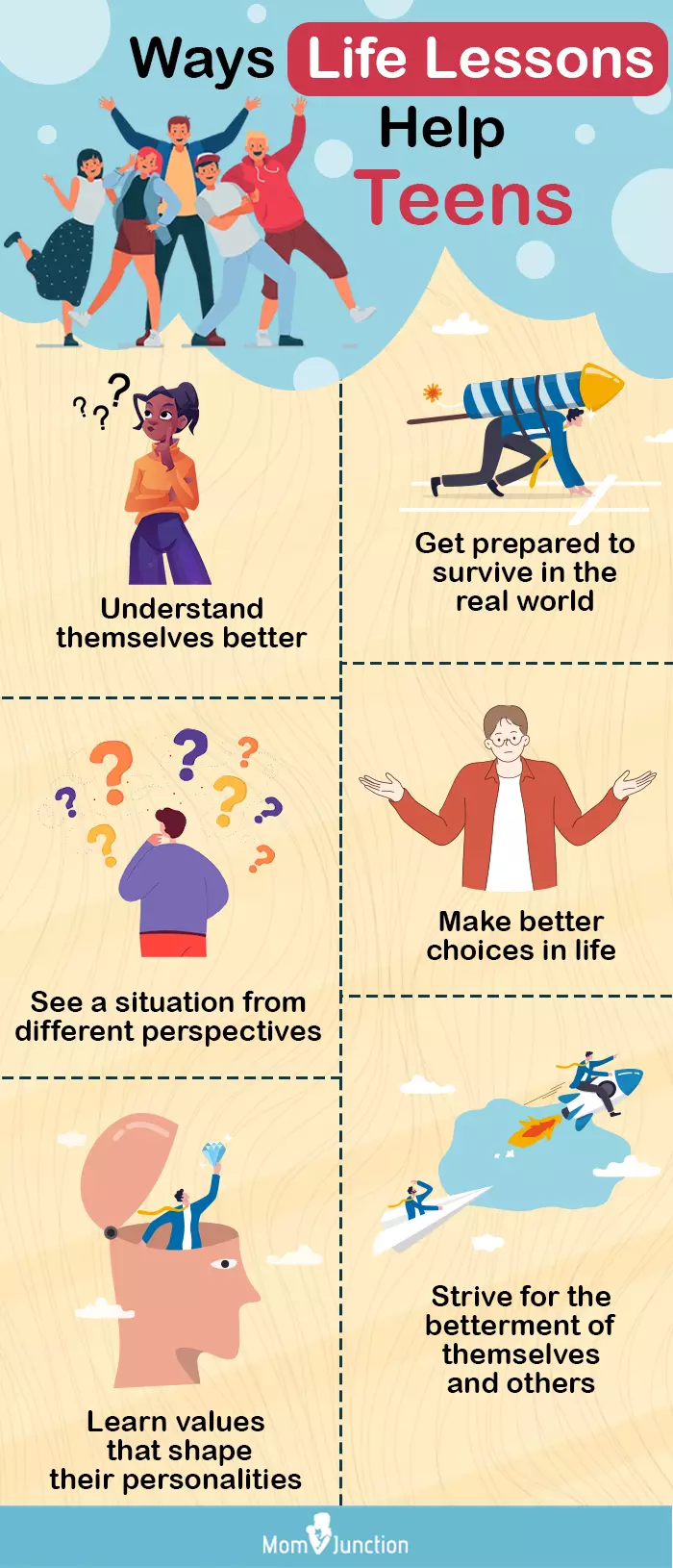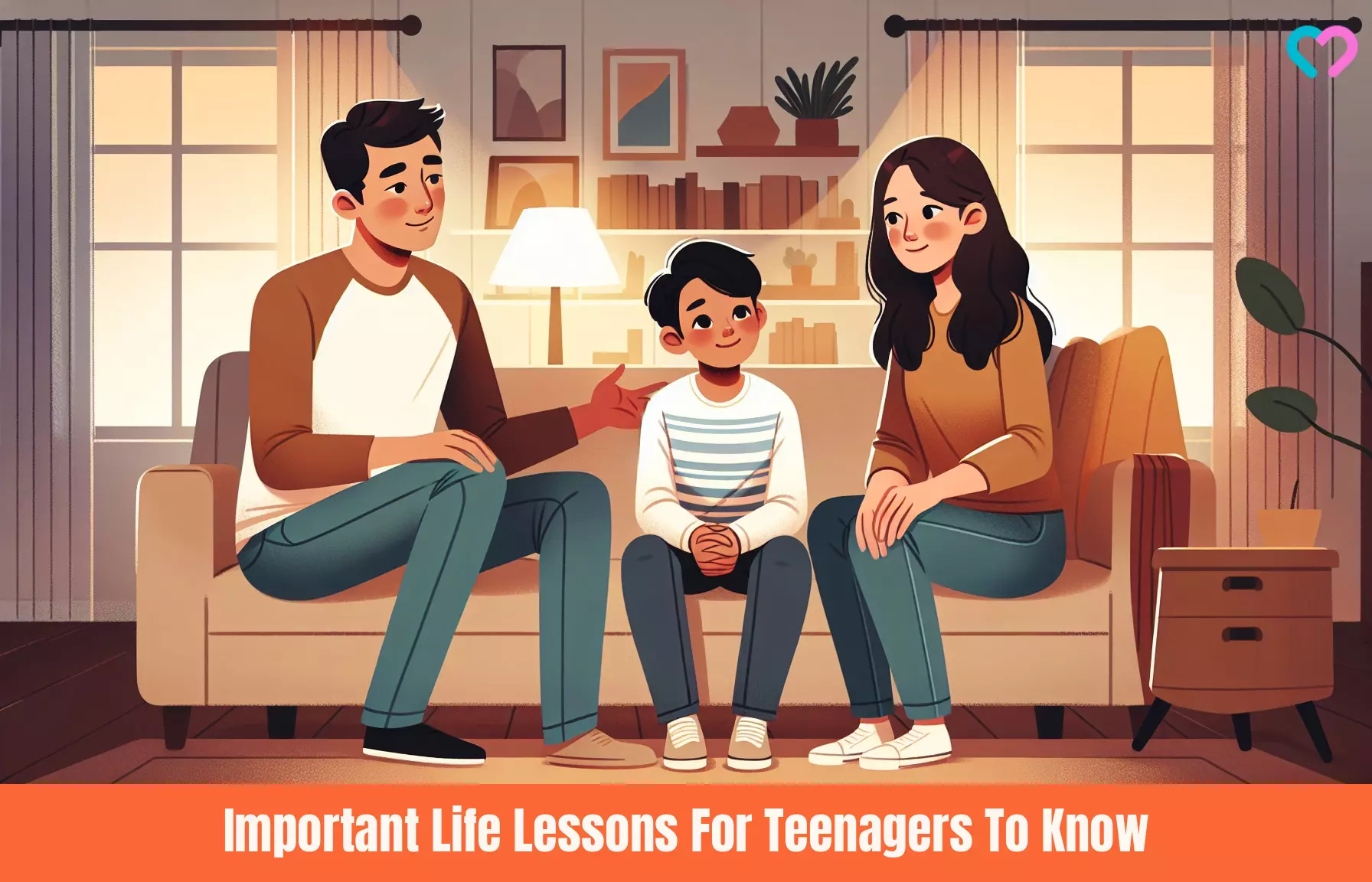
Image: iStock
Life lessons for teenagers from experienced individuals can deeply impact their thought processes and approaches to various situations. Moreover, with age and maturity, one’s understanding of life becomes more profound. Hence, receiving wisdom from an older individual who has been through similar situations helps offer a different perspective.
Teenage is a time of many changes, which may cause teens to be confused about several things, such as relationships, their future, and their personality. As a result, they may also be tempted to make hasty decisions that can have long-term implications. Teaching them life lessons is crucial. These lessons can lay the foundation for future success and emotional well-being. They also help teens build resilience and have a sense of identity. Here are some life lessons for teenagers that can change their outlook and prevent future regret.
Key Pointers
- Teaching life lessons to teenagers can assist them in making morally sound decisions in life.
- Imparting these lessons can shape their character and guide them in becoming better individuals.
- Lessons on principles and etiquette can help teenagers develop a strong moral compass for life.
- Teaching respect, gratitude, and humility can empower teenagers to become more self-reliant.
- Encouraging teenagers to prioritize their health and practice self-care can lead to a more fulfilling life.
20+ Life Lessons For Teenagers
Life lessons help teenagers power through difficult phases when everything does not seem to be in their favor. Here are some tips on facing the real world to help them analyze any tough situations they may face:
1. Prioritize your health

Image: IStock
Often, teenagers misinterpret what “fun” is. For example, they may think getting drunk or smoking with their pals is what fun looks like. “Living in the moment” only seems fine when you don’t consider the risk of ruining their tomorrow because of it. Therefore, help your teen understand that the implications of their decisions can have a long-term impact on their life.
2. Stand up for yourself
It is not practical to expect people to be with us and support us in every decision we make. Therefore, teach your teen to be their own cheerleader and stand up for what they believe in. It may not come easily at first, but it can be developed over time. Show them how they can do it. Let them believe in themselves, and then, whatever external support they get can be a bonus.
3. Being confused is normal
Many teens feel overwhelmed as they grow older because they have not figured out what they want to be in life. This anxiety and fear may push them to make hasty decisions. Hence, tell your teen that it is okay if they have not figured out their life yet, as they have enough time to do. You can also give them tips to solve teenage problems and solutions for whatever they may be facing.
 Point to consider
Point to consider4. Opt for things that benefit you
Peer pressure is a prevalent issue in teenage years, causing teens to do the things their peers approve of. However, they should know that having good decision-making skills when it comes to themselves is important to shape a better future. For example, choosing to say no in specific situations or enrolling in a less popular but promising course is a step toward building one’s personality.
Souvik Pal, a blogger, shares valuable life lessons that he wishes he knew when he was a teen. He says, “I surrounded myself with negative-minded friends in my school and college life. I thought it was cool to be with them. Making so much fun, enjoying life to the fullest. I thought my life would continue like this. Yes, temporarily, it was cool.
“However, when I wanted to change my life in a positive direction, then I realized that I had done nothing so far. I just wasted my student life doing unproductive and energy-draining activities (i).” Thus, it is essential for one to know what is good and bad and surround oneself with people and things that will benefit them in the long run.
5. Uphold your principles
Principles build character. Letting go of their principles changes who they will become. Instead, teach them to stick to their roots and be grounded to see things from the right perspective.
6. Being unique is good

Image: Shutterstock
Each individual is special and different. We all excel at different things; hence, teach them that drawing comparisons with their peers is not a healthy way to judge themselves. Instead, give them the confidence to be themselves. Encourage them to participate in various activities to find their passions and interests.
7. Earn respect
Respect cannot be demanded; it can only be earned with good deeds, compassion, kindness, and honesty. Make them learn from people around them, show them how great leaders earn respect. Be an example for them.
8. Give respect
Teach them that to gain respect, they must give respect to others. Showing respect does not comprise idealizing someone but treating them the way you’d wish to be treated.
9. Outgrowing people is natural
We lose friendships as we move on in life. But in adolescence, it is hard to accept that we have to part with a friend we dearly love. Kids believe that they make friendships that stay ‘forever;’ hence, when they break for some reason, it is difficult to accept it. Hence, tell them that it is okay to let go sometimes because you cannot force people to be a part of your life. Reassure them that they will find multiple opportunities to make new friends in the future.
10. Show gratitude

Image: Shutterstock
Being thankful for what they have rather than pitying themselves for what they don’t will change their perspective. Teenage children should be taught that everything is not measurable on the same scale, and each one lives in different situations. Hence, showing gratitude for the comforts they have been blessed with is the right approach to life. Also, encourage them to practice empathy by volunteering, listening to others, and engaging in community service. This will help them foster deeper connections and a sense of belonging.
11. Be responsible
Give them household responsibilities. Talk to them about family finances, how they are spent, the savings being made, etc. Let them know how their parents strive to give them a good life. Let them go out and see the real world. This will not only help address the question of how to make your teenager responsible but also acquaint them with reality. Teach them how to manage their money, including budgeting, saving, and making informed spending decisions, to help them create a stable financial future.
12. Stay humble
Teach teenagers to respect their roots
. No matter their achievements, they should show empathy, stay connected to their loved ones, and respect them the same way. The higher they grow, the more grounded they should be.
13. Don’t hesitate to apologize
Saying sorry when one is wrong does not make them look foolish. On the contrary, a person who apologizes and accepts their mistakes learns more and improves. Teenagers should be taught that stubbornness only restricts their learning. To grow, they need to accept their mistakes and overcome them.
 Point to consider
Point to consider14. Observe and learn from mistakes
Much can be gained by observing the mistakes of others and learning from them. Experience and exposure are the biggest teachers in life. The more they observe, the more they will learn.
15. Stand tall

Image: Shutterstock
Confidence is the key to a strong personality and has a huge impact on your self-esteem. A confident teenager can grow at a better pace than one who’s still in their shell. Thus, encourage them to explore themselves and learn new skills to gain more confidence.
16. Be street-smart
Education can only help an individual to a certain extent. However, learning to think on one’s feet is one of the most important life skills for teens. It can be developed with exposure and help things work out in their favor.
17. Stand by your moral instincts
More often than not, your conscience will show you the right way and help you deal with certain circumstances. Teenagers should learn that there are no shortcuts in life, and everything comes at a cost. Therefore, compromising on their morality will not bring them real happiness.
18. Practice fair work ethics
Setting their principles straight and working toward their goals in a fair manner should be their priority. Even if using unfair means may help them achieve their goals in a shorter period, they should choose fair work ethics over everything.
19. Don’t give up
Setbacks are a part of life, but we may feel tempted to give up on everything we have worked for. However, if we don’t keep going, we might fall short of fulfilling our dreams. Therefore, teenagers need to be motivated to keep going in difficult circumstances.
 Do remember
Do remember20. Laugh a little louder and love a little harder

Image: Shutterstock
Teenage is a phase where children are exposed to multiple complex situations. Teach them that pushing through life with a smile on their face and people they love beside them makes things a tad easier.
21. Be a good listener to understand better
Cutting people short and interrupting them to make a point are disrespectful to the person speaking. By becoming good listeners, they will learn to pick things up faster. It will also make their personality more appealing because there are few good listeners.
Frequently Asked Questions
1. How is the teenage brain different from an adult’s?
A few image studies reveal that a teen’s brain functions differently than an adult’s while thinking and solving problems. Their responses are reportedly influenced by emotions more than logic (1).
2. What do teenagers worry about?
According to a survey, body image, academic performance, family issues, coping with peer pressure, stress, anxiety, and other mental health-related problems are among the top factors that are worrisome for most teens (2).
3. What is the hardest age for a teenager?
There is no specific age that may be considered difficult for a teenager. Teenage years between 13 and 19 are usually considered hard due to the various hormonal alterations and other external struggles (3).
4. What are some effective ways to teach life lessons to teens?
Activities that require practical application can significantly enhance their understanding of life lessons. Try to engage them in open discussions about real-life scenarios, share personal anecdotes, and encourage reflective journaling.
Teenagers often hear adults say that life is full of conflicts and difficulties; however, that simply means that life requires the right type of effort and life skills to sail through. Being optimistic and accepting each experience as a life lesson can broaden the perspective of teenagers. Personal growth requires consistent effort but is rewarding and gives a new definition to life and living with content.
Infographic: What Is The Importance Of Life Lessons For Teenagers?
Life lessons are valuable learnings that give helpful knowledge about life. This knowledge brings positive changes in an individual, shaping a better future. Knowing why teenagers should focus on learning life lessons is equally important. Our infographic below highlights the pertinence of life lessons for a teen’s successful future. Illustration: Momjunction Design Team
Illustration: Important Life Lessons For Teenagers To Know

Image: Dall·E/MomJunction Design Team
This video imparts valuable life lessons, guiding teens toward confident decisions, personal growth, and a brighter future! Prepare to feel inspired and motivated to make your life great. Learn how to choose wisely and achieve your dreams.
Personal Experience: Source
MomJunction articles include first-hand experiences to provide you with better insights through real-life narratives. Here are the sources of personal accounts referenced in this article.
i. 7 Important Life Lessons For Every Teenager.https://medium.com/@souvik_pal/7-important-life-lessons-for-every-teenager-83cc01048eb0
References
- Teen Brain: Behavior Problem Solving and Decision Making.
https://www.aacap.org/AACAP/Families_and_Youth/Facts_for_Families/FFF-Guide/The-Teen-Brain-Behavior-Problem-Solving-and-Decision-Making-095.aspx - Teenage Issues: What Teens Worry About.
https://www.btg.org.au/teenage-issues-what-teens-worry-aabout/ - Common Teenage Problems And Their Solutions.
https://www.jbcnschool.edu.in/blog/common-teenage-problems-solutions/
Community Experiences
Join the conversation and become a part of our nurturing community! Share your stories, experiences, and insights to connect with fellow parents.
Read full bio of Shreshtha Dhar
Read full bio of Kavita Kankani
Read full bio of Harshita Makvana
Read full bio of Apoorva K





















